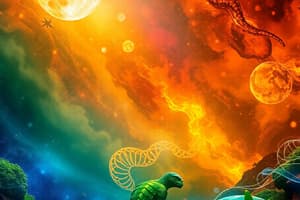Podcast
Questions and Answers
What is the driving force behind evolution?
What is the driving force behind evolution?
- Genetic variation
- Adaptation
- Natural selection (correct)
- Mutation
What provides the raw material for evolution?
What provides the raw material for evolution?
- Fossil record
- Adaptation
- Gene flow
- Genetic variation (correct)
How do advantageous traits become more common in a population?
How do advantageous traits become more common in a population?
- By natural selection (correct)
- As a result of gene flow
- Through genetic drift
- Due to fossil record
Which provides evidence of the evolution of life on Earth?
Which provides evidence of the evolution of life on Earth?
What is adaptation?
What is adaptation?
What is a form of adaptation mentioned in the text?
What is a form of adaptation mentioned in the text?
What evidence supports the theory of evolution?
What evidence supports the theory of evolution?
What is one example of evolution in action mentioned in the text?
What is one example of evolution in action mentioned in the text?
Study Notes
Evolution: A Journey Through Time
Evolution is the process by which various species of organisms change and develop over time. This process is driven by a combination of factors, including natural selection, genetic variation, and adaptation. In this article, we will explore these concepts and their role in shaping the diversity of life on Earth.
Natural Selection
Natural selection is the driving force behind evolution. It is a process that occurs when certain traits become more or less common in a population over successive generations. This happens because organisms with advantageous traits are more likely to survive and reproduce, passing those traits on to their offspring. Over time, these advantageous traits become more common in the population, leading to the evolution of new species.
Genetic Variation
Genetic variation is the raw material for evolution. It is the differences in genetic makeup that exist within and between populations of organisms. These differences can arise through mutations, gene flow, and genetic drift. Genetic variation provides the raw material for natural selection to act upon, leading to the evolution of new species.
Fossil Record
The fossil record provides evidence of the evolution of life on Earth. Fossils allow scientists to trace the lineages of extinct species and see how they changed over time. By studying the fossil record, scientists can infer the mechanisms of evolution and understand the relationships between different species.
Adaptation
Adaptation is the process by which organisms become better suited to their environment. This can occur through natural selection, as advantageous traits become more common in a population. Adaptations can be physical, such as the development of camouflage, or behavioral, such as the evolution of social structures.
Evidence for Evolution
There is a wealth of evidence supporting the theory of evolution. This evidence includes the fossil record, similarities in the DNA of different species, and the studied patterns of genetic variation. By studying these patterns, scientists can infer the mechanisms of evolution and understand the relationships between different species.
Evolution in Action
Evolution is an ongoing process, with new species continuing to evolve today. One example of this is the evolution of antibiotic resistance in bacteria. As antibiotics are used to treat infections, bacteria with resistance genes are more likely to survive and reproduce, leading to the evolution of antibiotic-resistant strains.
Conclusion
Evolution is a complex and fascinating process that has shaped the diversity of life on Earth. Through natural selection, genetic variation, and adaptation, new species have emerged and old ones have become extinct. By studying the evidence for evolution, we can gain a deeper understanding of the natural world and our place within it.
Studying That Suits You
Use AI to generate personalized quizzes and flashcards to suit your learning preferences.
Description
Explore the fundamental concepts of evolution, including natural selection, genetic variation, adaptation, and the evidence supporting the theory. Learn how these factors have shaped the diversity of life on Earth, as well as ongoing evolutionary processes.




